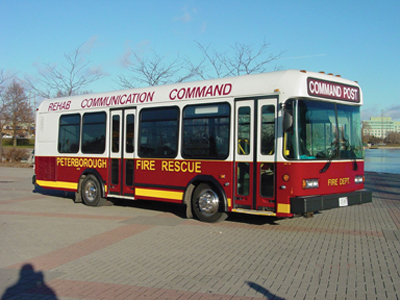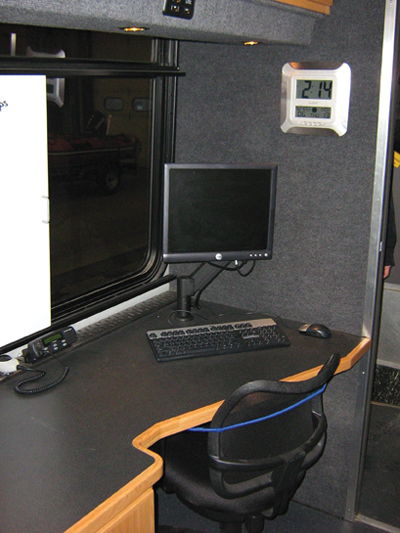
Features
Hot topics
Response
Building a police-fire command centre
The Peterborough Lakefield Community Police Service and the Peterborough Fire Department recently transformed a city bus into a mobile command centre for use in support of emergency services.
June 19, 2009
By Cory McMullan and David Gillespie
The Peterborough Lakefield Community Police Service and the Peterborough Fire Department recently transformed a city bus into a mobile command centre for use in support of emergency services.
 |
|
| Peterborough, Ont., police and fire worked together to transform a city bus into a mobile command centre. Photos courtesy Peterborough Fire Department
|
The vehicle is shared between fire and police services, with fire maintaining logistical control and storage of the vehicle.
After experiencing floods in 2002 and 2004, officials realized that the almost 14-metre trailer with one conference table, a washroom and radio room no longer met their needs. In this case, a bigger trailer didn’t make for a better command post.
Running a few investigations and managing a community wide recovery operation taught police and fire officials that a mobile command centre must be quick to deploy, user friendly for various incidents and affordable.
The previous command post was a fifth-wheel trailer that was configured for use in the 1980s. It required a tow vehicle and a licensed driver and was used only as a last resort. Peterborough police and fire knew the new model had to be self-powered and not licensed as a tractor-trailer, rather it needed to be easily operated by a trained and licensed police officer or firefighter.
Representatives from both agencies toured command posts operated by the Ontario Provincial Police, Durham Regional Police, Mississauga Fire & Emergency Services, Toronto Fire Services, Ottawa Police Service, Palm Beach Fire Rescue and numerous manufacturers at trade shows. They determined, through their research, that most command posts were custom-built, box-style trucks with privacy areas for command, communications, negotiation and planning tasks. Each agency had shared lessons it had learned: make the command post simple to use and easily accessible; and don’t use checkerplate for the interior, instead use dark, wall carpet to deaden sound and on floors and for easy maintenance.
The next task was sizing a vehicle appropriate for the needs of both agencies.
As a city serving a region of 125,000 people, the Peterborough Lakefield Community Police Service deals with hostage negotiations, crime-scene investigations, bomb-threat responses, missing persons search co-ordination, public protests and R.I.D.E. programs. The fire service deals with house fires, apartment fires, technical rescue, hazardous materials calls, weather-driven incidents and training activities.
Considering the average number of command and support staff in a simple investigation or emergency, Peterborough police and fire designed the command post for four or five people in the command area and two to four in the negotiation / rehab area. It was decided to make the command post user friendly for the officers and fire commanders who might be in there only a few times a year.
Police and fire officials trimmed a long list of wants and decided on more needs such as on-board computers with a network printer/copier and future access to wireless and hardline communications. All equipment is easy to use and the entire vehicle orientation takes just 10 minutes. The next step was figuring out how to go outside the sandbox to make the proposed command centre a reality.
 |
|
| Interior work station of Peterborough command bus. Photos courtesy Peterborough Fire Department
|
Affordability
Most custom-built command vehicles range in cost from $250,000 to $600,000, depending on size, number of rooms, slide-outs and onboard technology. Based on priorities in other city services, fleet maintenance and rotation, this project did not fall within our individual or collective capital budgets. Continuing the police/fire partnership was fundamental to making this vehicle a reality.
Peterborough officials turned to the local transit service to determine if an 11-metre city bus could be transformed into a command post. This provided a tangible vehicle around which to base discussions and redesign plans with key stakeholders. A one-dollar ownership transfer cost from one city department to another helped.
Large corporations were not interested in covering the entire cost, so, with guidance from a professional fundraiser, the command-post team scratched the goodwill sponsorship approach and instead focused on investing in a joint community response. Costs were itemized, such as $4,000 for the kitchen or $2,000 for a command desk. It was surprising to watch various corporate sponsors choose items to help fund that were important to them, and then to quickly get on board.
After reaching out to three firms that specialize in custom-built command posts, and after much discussion about the possibilities and limitations of using a bus, PK VanBodies of Oshawa, Ont., was contracted. PK is well known for fabricating command posts, mobile offices, mobile research labs, and specialty fire and tactical vehicles. It has a long list of municipal, provincial and federal clients across central and eastern Canada.
Making it happen
The 1999 Eldorado bus had 130,000 kilometres on it (low for a bus). Gutting of the seating and the installation of walls, partitions, counters, cabinets, removable desks wiring and a kitchenette came to $60,000. Installing surplus computers and radio equipment was another $5,000. Paint and lettering amounted to $10,000.
Peterborough Lakefield Community Police contributed $40,000 and three corporations donated $20,000 each. Peterborough Fire was responsible for painting the bus and for mechanical maintenance and other costs.
The new command post has been successfully used 14 times since its arrival in April 2008. Responses have included a few major fires, R.I.D.E. programs, a hostage negotiation, a few public events and training exercises. Emergency personnel have said they appreciate the faster deployment time, the more effective communication among lead officers and agencies, the warm place for rehab and to get out of inclement weather, and the greater awareness of the presence of emergency services on scene.
Members of the Peterborough Lakefield Community Police Service and the Peterborough Fire Department are proud of their partnership and the creative use of resources towards this command vehicle. It has quickly become a significant tool through which both agencies have improved their efficiency and effectiveness in the community.
Cory McMullan is an inspector with the Peterborough Lakefield Community Police. David Gillespie is a firefighter with the Peter-borough Fire Department. The authors can be reached at cmcmullan@peterborough.ca and dgillespie@peterborough.ca
Print this page